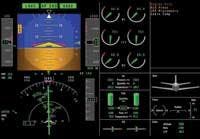Personnel at Seaweed Systems in Burlington, Mass., needed automated tools to analyze and test the company’s high-performance OpenGL graphics drivers and devices for safety-critical military and aerospace applications. They found the necessary software testing solution at LDRA Technology Inc. in San Bruno, Calif.
Seaweed Systems’ engineers developed the company’s OpenGL driver to be compliant to DO-178B Level A, because of the safety-critical nature of the applications that are developed using the driver.
DO-178B Software Considerations in Airborne Systems and Equipment Certifi-cation, a standard developed by RTCA Inc. and EUROCAE (European Organization for Civil Aviation Equipment), provides guidance for software development in an effort to avoid failure conditions in the system. The Federal Aviation Administration (FAA) accepts use of DO-178B as a means of certifying avionics software.
“The challenge was to be able to capture DO-178B Level A structural coverage data across the entire Seaweed Systems software while executing our automated test suite,” Martin Beeby, company quality officer at Seaweed Systems, says. “Previous attempts to capture coverage using other tools had resulted in significant effort integrating the structural coverage capture tool with the operating system and test suite. With the LDRA tool suite, after the scheme for instrumenting and capturing the coverage data had been designed, it was then possible to instrument all the Seaweed Systems source code automatically as part of the standard build process.”
The LDRA tool suite is now in place to support all Seaweed Systems customers’ operating system configurations, without the need for any additional work. The LDRA suite is qualified as a verification tool for DO-178B, meeting Seaweed Systems’ strict certification goals. Seaweed Systems’ management is mandating the use of the LDRA tool suite for structural coverage in future projects. For more information, visit LDRA Technology Inc. online at www.ldra.com.

